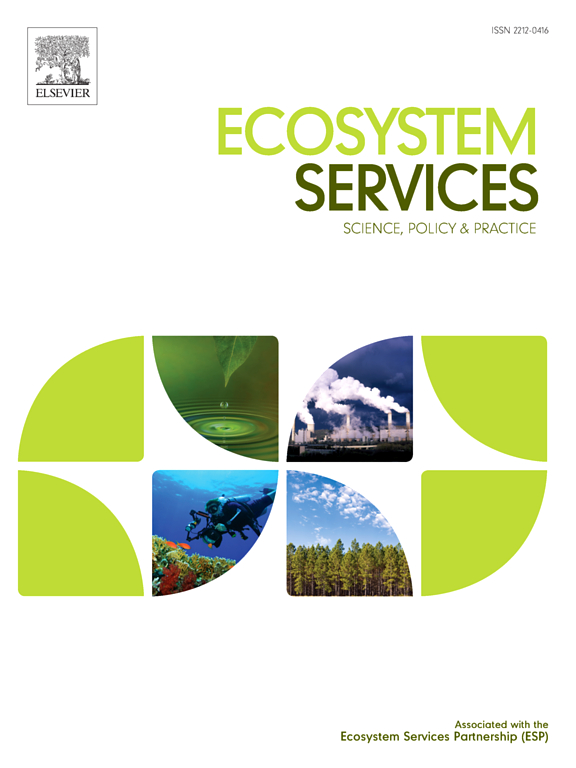The role of ecosystem services in the pursuit of the doughnut economy – Implications for meat and dairy agroecosystems
IF 6.6
2区 环境科学与生态学
Q1 ECOLOGY
引用次数: 0
Abstract
The doughnut economy framework provides an increasingly popular visualisation of sustainable development, in which the ecological ceilings tied to planetary boundaries are not breached and needs associated with social foundations are satisfied. This conceptual study explores the ecosystem services (ES) of meat and dairy agroecosystems, considering the various ways in which they may impact the core ecological and social components of the doughnut economy framework. Based on ES drawn from a recent systematic literature review, this study discovers that meat and dairy agroecosystems may both contribute to and undermine the pursuit of the doughnut economy in multifaceted ways. Although contributing to the social foundations through provisioning of nutritious food, income and work, and positive health outcomes, ES losses from agroecosystems typically impose direct strain on various ecological ceilings, especially those tied to climate change, land conversion, biodiversity loss, nitrogen and phosphorous loading, and freshwater withdrawals. Furthermore, ES gains, which underpin the pursuit of social foundations, such as food and income and work, can lead to trade-offs with these ecological ceilings, the extent to which depends on the production mode employed. This helps to underscore the importance of sustainable management of agroecosystems, including low-impact and regenerative techniques that can promote the supply of various ES. The paper discusses how the future quantification of indicators and thresholds is important for the practical operationalisation of the doughnut economy framework in different sectoral, spatial, and temporal contexts.
生态系统服务在追求甜甜圈经济中的作用-对肉类和乳制品农业生态系统的影响
甜甜圈经济框架为可持续发展提供了一个日益流行的可视化方案,在该方案中,与地球边界相关的生态上限不会被突破,而与社会基础相关的需求却能得到满足。本概念研究探讨了肉类和乳制品农业生态系统的生态系统服务 (ES),考虑了它们可能对甜甜圈经济框架的核心生态和社会组成部分产生影响的各种方式。根据最近系统性文献综述中的生态系统服务,本研究发现,肉类和乳制品农业生态系统可能以多方面的方式促进和破坏甜甜圈经济的追求。虽然通过提供营养食品、收入和工作以及积极的健康结果为社会基础做出了贡献,但农业生态系统的 ES 损失通常会对各种生态上限造成直接压力,尤其是那些与气候变化、土地转换、生物多样性丧失、氮和磷负荷以及淡水抽取相关的上限。此外,作为追求社会基础(如食物、收入和工作)的基础,ES 收益会导致与这些生态上限的权衡,其程度取决于所采用的生产模式。这有助于强调农业生态系统可持续管理的重要性,包括可促进各种生态系统服务供应的低影响和再生技术。本文讨论了指标和阈值的未来量化对甜甜圈经济框架在不同部门、空间和时间背景下的实际操作的重要性。
本文章由计算机程序翻译,如有差异,请以英文原文为准。
求助全文
约1分钟内获得全文
求助全文
来源期刊

Ecosystem Services
ECOLOGYENVIRONMENTAL SCIENCES&-ENVIRONMENTAL SCIENCES
CiteScore
14.90
自引率
7.90%
发文量
109
期刊介绍:
Ecosystem Services is an international, interdisciplinary journal that is associated with the Ecosystem Services Partnership (ESP). The journal is dedicated to exploring the science, policy, and practice related to ecosystem services, which are the various ways in which ecosystems contribute to human well-being, both directly and indirectly.
Ecosystem Services contributes to the broader goal of ensuring that the benefits of ecosystems are recognized, valued, and sustainably managed for the well-being of current and future generations. The journal serves as a platform for scholars, practitioners, policymakers, and other stakeholders to share their findings and insights, fostering collaboration and innovation in the field of ecosystem services.
 求助内容:
求助内容: 应助结果提醒方式:
应助结果提醒方式:


